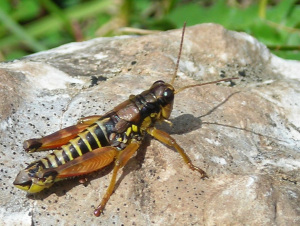Encountering something new and terrifying is not an experience many of us seek out deliberately, but simple astonishment is usually a fruitful emotion. We have the opportunity to learn when we come up against the unfamiliar. Astonishment imprints something in our minds, and prompts us to ask questions. Take a child’s first encounter with a grasshopper: How can such a little thing make such a big noise without seeming to move a muscle? Why does it jump away so fast? How can it jump so high with such little legs? Such questions can lead to a lifetime’s fascination.
Theologian Jurgen Moltmann has written about the experience of wonder and its importance in both science and theology. The ancient Greek philosophers taught that knowledge begins in wonder. When we are open to something and give ourselves up to discovering what it has to show us, we learn. When we already ‘know’ what it is about we shut down our perceptions and it has nothing to tell us.
Children are great learners because they are constantly encountering things for the first time. They have no choice but to be open to the world and what it has to show them. The danger is that as adults our vision is clouded by familiarity. Although each event only happens once, we ‘know’ what is going to happen. ‘I’ve seen spring before, it’s all about lambs and crocuses’. But have you noticed the anemones growing behind the compost heap? ‘I’ve heard Beethoven’s 3rd Symphony, I have it on CD’. But have you heard it in this concert hall? Have you played it? ‘I’ve already read that book’. But did you see how that minor character is central to the story? ‘I did the experiment ten times’. But did you notice the outlier in the data? Is it significant?
Motlmann observes that astonishment is remarkably close to presence of mind. If we cultivate the ability to see the unique in what is happening around us and are open to new experiences we will continue to learn a great deal. The most astonishing thing we will encounter is the fact of our existence in the first place, and all our knowledge traces back to this first event. It is important to remember the wonder of being,
Otherwise we could come to see only what we want to see, and go almost blindly through life. Otherwise we could cease to know other people because we have tethered ourselves fast to our pre-judgements about them, and simply want to have these confirmed. Otherwise we could come to think that the products of our religious fantasy are God, and notice nothing of the living God. Reality is always more surprising than we are capable of imagining.
Jurgen Moltmann, God for a Secular Society
Celia Deane Drummond, a theologian with a second doctorate in plant physiology, also values the humility that seeks to explore rather than master the unknown. She writes that unless we pay attention to the world we will be unable to wonder, and we won’t develop the wisdom that stems from wondering.
In cultivating an attitude of wonderment, Moltmann writes, we are not simply sitting back and letting our minds absorb things passively. We are opening ourselves up to new avenues of intellectual exploration. When we try to tie things down once and for all we lose something. Gregory of Nissa said that ‘Concepts are idols, only wonder understands’.
The One we call God eludes our ideas, which nail him down, and our concepts, which try to bring him within our grasp; and yet he is closer to us than we ourselves – interior intimo meo, as Augustine knew…In ‘the darkness of the lived moment’ we become aware of God’s presence. Wonder is the inexhaustible foundation of our community with each other, with nature, with God. Wonder is the beginning of every new experience and the ground of our creative expectation of the new day.
Jurgen Moltmann, God for a Secular Society
Jurgen Moltmann, God for a Secular Society: The Public Relevance of Theology, SCM Press, London, 1999, p149-152.
Jurgen Moltmann, Science and Wisdom, SCM Press, 2003, p141-147.
Celia Deane Drummond, Wonder and Wisdom, Templeton Foundation Press, 2006.





